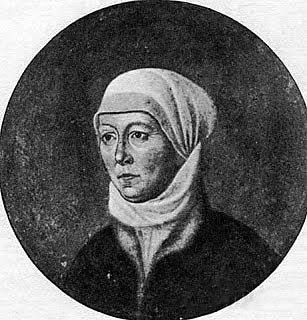Readings:
Genesis 38:6-26
Psalm 71:17-23
Galatians 5:13-18
Luke 4:23-30Preface of a Saint (2)
PRAYER (traditional language)
Almighty God, whose servant Katharina Zell toiled for the reform of thy church both in word and in deed: Fill us with the wisdom to speak out in defense of thy truth, with love for thee and for our neighbor, that we may serve thee and welcome all thy people with a mother's heart; through Christ our Lord. Amen.
PRAYER (contemporary language)
Almighty God, whose servant Katharina Zell toiled for the reform of your church both in word and in deed: Fill us with the wisdom to speak out in defense of your truth, with love for you and for our neighbor, that we may serve you and welcome all your people with a mother's heart; through Christ our Lord. Amen.
Lessons revised at General Convnetion 2024.
Return to Lectionary Home Page
Webmaster: Charles Wohlers
Last updated: 8 July 2024
KATHARINA ZELL
CHURCH REFORMER AND WRITER, 1562
 Katharina Schütz Zell (1497/8 - September 5, 1562) was a Protestant reformer and writer during the Protestant Reformation. She was one of the first Protestant women to marry a clergyman. Katharina lived all of her life in Strasbourg, now part of France.
Katharina Schütz Zell (1497/8 - September 5, 1562) was a Protestant reformer and writer during the Protestant Reformation. She was one of the first Protestant women to marry a clergyman. Katharina lived all of her life in Strasbourg, now part of France.
Katharina Schütz Zell was most likely born in early 1498 in Strasbourg. Her family was not overly wealthy, but most-likely lived comfortably. Katharina received an excellent vernacular education. It is clear that she learned to read and write German fluently, and eventually developed some basic knowledge of Latin. Katharina’s interests in learning were mainly religious, as well as professional training, particularly preparation for an independent profession.This was also not the end of her education. She took it upon herself to continue independent learning throughout the rest of her life.
When Katharina was still fairly young, the teachings and writings of Martin Luther gained fame and began to spread. Katharina was introduced to much of these new teachings and views of religion by Matthew Zell, the pastor who took charge of the St. Lawrence Cathedral in Strasbourg in 1518. Katharina eventually started to take these beliefs as her own through Zell’s sermons and Luther’s teachings. A few years after Matthew came to Strasbourg, he and Katharine were married by Martin Bucer on December 3, 1523. Katharina Schütz was convinced that she was called to marry Matthew Zell as an expression of her faith in God and her love for others. Katharina was one of the first people to get married to a pastor, even before the marriage of Martin Luther, something that was not necessarily thought too highly of at the time. Her marriage was what would be seen as a true equal partnership in a society that required that the good wife be silent and obedient, and in which women usually only achieved independence as widows. Katharina had two children with Matthew, although they both died at very young ages. Mathew died on January 9, 1548. Though Katharina mourned and grieved his death, this did not stop her work.Katharina herself became ill in 1561 and died on September 5, 1562.
Katharina is noted greatly for her writings and unique personal beliefs. She was very open-minded for a person of her time period and showed it through her actions and writings.
One of Katharina’s occupations was that of a pamphleteer. Pamphlets were essential for Protestantism during the Reformation. The pamphlets served to inform a wide audience quickly and with dogmatic effectiveness on current affairs. As a woman of this time period, Katharina did have challenges not faced by male pamphleteers would not have had. In facing criticism Katharina would remind her criticizers that she never forgot her responsibility as a wife and that she was her husband’s partner. “This is why my pious husband only called me his curate, although I never stood on the pulpit – something I did not have to do in my line of duties.”
Katharina’s experiences do not reflect those of the majority of women during the Reformation. Women of this time period were expected to conform to certain roles and rules which were institutionally and socially enforced on them. Katharina is an example of a woman who broke through these barriers to get her beliefs out to the public. Katharina also differs from some other women reformers in that she was not subject to much threatening opposition. One woman who faced some of this opposition was Argula von Grumbach, another influential pamphleteer.
more at Wikipedia